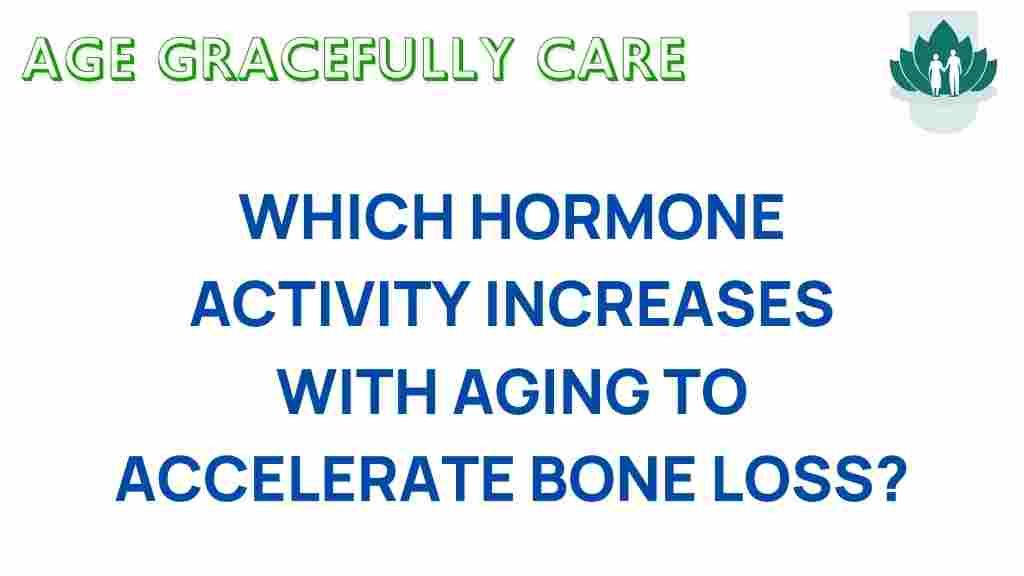Unraveling the Hormonal Secrets Behind Aging and Bone Loss
Aging is an inevitable part of life, but the physiological changes that accompany it can often lead to significant health challenges, particularly regarding bone loss and the risk of osteoporosis. Central to understanding these changes is the role of hormones, which are critical in regulating various bodily functions including metabolism, bone health, and overall wellness. In this article, we will delve into how hormones affect aging and bone loss, explore the connection between calcium and bone density, and provide insights for maintaining a healthy endocrine system.
The Role of Hormones in Aging and Bone Health
Hormones are chemical messengers produced by the endocrine system that regulate many bodily functions. As we age, hormonal changes can significantly impact our health, particularly our bones. Key hormones related to bone health include:
- Estrogen: Plays a critical role in maintaining bone density. Women experience a sharp decline in estrogen levels during menopause, which can lead to increased bone loss.
- Testosterone: Important for bone mass in men. Low testosterone levels can result in osteoporosis.
- Parathyroid hormone (PTH): Regulates calcium levels in the blood and bone metabolism. Elevated PTH can lead to bone loss.
- Calcitonin: Helps regulate calcium levels and inhibits bone resorption.
- Cortisol: Chronic stress can elevate cortisol levels, leading to increased bone loss.
Aging affects the secretion and balance of these hormones, contributing to a decline in bone density and an increased risk of fractures. Understanding the relationship between hormones, aging, and bone loss is crucial for developing effective prevention and treatment strategies.
Understanding Osteoporosis
Osteoporosis is a condition characterized by weak and brittle bones, making individuals more susceptible to fractures. It is often called a “silent disease” because bone loss occurs without symptoms until a fracture occurs. Factors influencing osteoporosis include:
- Genetics: Family history of osteoporosis can increase risk.
- Age: The risk of osteoporosis increases with age.
- Gender: Women are at higher risk, especially post-menopause.
- Calcium and Vitamin D Levels: Low calcium intake and vitamin D deficiency can lead to weakened bones.
- Lifestyle: Sedentary lifestyle, smoking, and excessive alcohol consumption can contribute to bone loss.
To combat osteoporosis, it is essential to understand how hormones play a role in maintaining bone strength and density.
The Connection Between Hormones and Calcium Metabolism
Calcium is a vital mineral for bone health. The body requires an adequate supply of calcium to build and maintain bone mass. Hormones regulate calcium metabolism in various ways:
- Estrogen: Enhances calcium absorption in the intestines and reduces calcium loss through the kidneys.
- PTH: Increases calcium levels in the blood by promoting bone resorption, calcium reabsorption in the kidneys, and activation of vitamin D.
- Vitamin D: Though not a hormone, it works closely with hormones to maintain calcium levels. It enhances intestinal absorption of calcium.
Maintaining adequate calcium intake through diet or supplements, along with ensuring optimal hormone levels, is essential for bone health as we age.
Strategies for Maintaining Hormonal Balance and Bone Health
To promote health and wellness as we age, it is vital to adopt strategies that support hormonal balance and prevent bone loss. Here are some effective steps:
- Nutrition:
- Ensure adequate intake of calcium-rich foods such as dairy products, leafy greens, and fortified foods.
- Incorporate vitamin D sources like fatty fish, egg yolks, and fortified milk.
- Eat a balanced diet rich in fruits, vegetables, lean proteins, and whole grains.
- Exercise: Engage in weight-bearing exercises such as walking, jogging, and strength training to stimulate bone formation and hormonal balance.
- Manage Stress: Practice stress-reduction techniques like yoga, meditation, or deep breathing to keep cortisol levels in check.
- Regular Check-ups: Monitor hormone levels and bone density through regular check-ups, especially if you have risk factors for osteoporosis.
- Limit Alcohol and Tobacco: Avoid smoking and limit alcohol consumption, as both can lead to hormonal imbalances and increased bone loss.
- Consider Supplements: If dietary intake is insufficient, consider calcium and vitamin D supplements after consulting with a healthcare provider.
Common Troubleshooting Tips
Despite our best efforts, some individuals may still experience hormonal imbalances and bone loss. Here are some troubleshooting tips to consider:
- Evaluate Your Diet: If you’re not getting enough calcium or vitamin D, reassess your diet and consider dietary changes or supplements.
- Consult a Healthcare Professional: If you suspect hormonal imbalances, seek advice from an endocrinologist or a healthcare provider who specializes in hormonal health.
- Stay Informed: Keep up-to-date with the latest research on hormones and osteoporosis to make informed decisions about your health.
- Join Support Groups: Consider joining groups for individuals with osteoporosis or hormonal issues for shared experiences and support.
Conclusion
Understanding the intricate relationship between hormones, aging, and bone loss is essential for maintaining health and wellness as we age. By focusing on proper nutrition, regular exercise, and effective stress management, we can support our endocrine system and reduce the risk of osteoporosis. Remember, the journey to optimal bone health involves proactive measures and continuous learning.
For more information on osteoporosis and hormonal health, consider visiting the National Osteoporosis Foundation for resources and guidance. By embracing a holistic approach to health, we can navigate the challenges of aging while keeping our bones strong and healthy.
For personalized advice and tips, feel free to explore articles on our site about nutrition and wellness.
This article is in the category Health and created by AgeGracefullyCare Team
